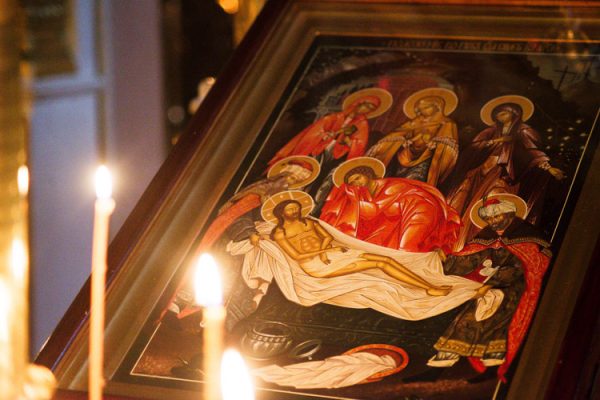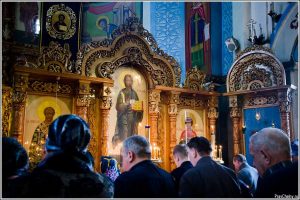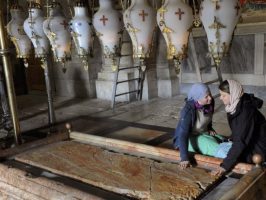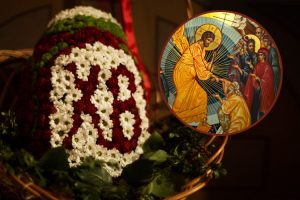The glad tidings of Pascha reveal the truth that there is no death! Yet, what do we know of death and of Resurrection; are we ready for the new life; can we exist there, beyond the grave? Archpriest Viasheslav Perevesentsev, Rector of the St. Nicholas the Wonderworker Church in the village of Makarovo (located near the town of Chernogolovka in the Moscow Region) answers these questions.
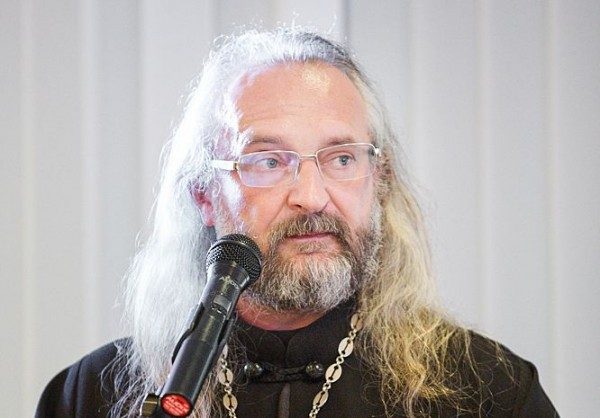
Archpriest Viacheslav Perevesentsev
It is difficult to talk about death. What makes it difficult is that, though the words themselves seem familiar and comprehensible, what they mean to us today very often has little in common with how the Church understands them based on the Holy Scriptures. That is why it is so hard for us to grasp the glad tidings of Pascha.
We understand the words, but behind the words there is a reality that is hard for us to understand. To the first Christians, as well as to those enlightened by the Spirit, this reality was not something abstract, it was not theoretical, it was not something they had read about – it was something they had experienced personally.
Here everything is connected. It is difficult to speak of death and Resurrection without the understanding of other, simpler things. Take salvation, for example. We call Christ our Saviour. But what we often mean by it is salvation from tribulations, sorrow and grief, illnesses and sufferings, etc. Doubtlessly, every one of us has experienced this kind of help from God. Yet, Christ came to save us from sin and from death, the main consequence of sin.
Christ brought glad tidings to men who felt that their enslavement to sin was their biggest sorrow. “O wretched man that I am! Who will deliver me from this body of death?” (Rom. 7:24) exclaims Apostle Paul. Those men felt the inevitability and the impasse of death. It didn’t even matter whether they were more pious or less, they were all going to die, and that was the end of it. We are also aware of the fact that we will die, but for some reason it doesn’t seem to worry us that much. Our culture has taught us to somehow deal with this knowledge, mainly by switching the focus of our anxieties and worries to something that is closer and easier to understand.
One of our contemporaries said, “We all know we are going to die, but few believe it.” And it is true, because believing means correlating our whole life with what we believe in. Faith is more than just knowing something. It is when what we know becomes the focus of our life, when it affects everything in life. And, in that light, we begin to understand the precept of the Holy Fathers “Remember you must die,” though many today are much more comfortable with one of the principles of psychotherapy “don’t scratch where it doesn’t itch.” To remember that we must die does not mean that our life should become more anxious, disquieting, and neurotic, it means we must make it fuller, more serious, and responsible. This is something that was already understood in the ancient times. Cicero’s assertion “To study philosophy is to learn to die” is well-known, so is Seneca’s “A man can only enjoy life when ready and prepared to abandon it.” The same thought was expressed by St. Augustine, “Only faced with death can a man be truly born.”
The awful reality we seem to be aware of often comes upon us unawares. People may live very differently, they can either be aware they have to answer for everything or remain unaware of it, ignore it. It is possible to live in different ways even knowing that eternity awaits and we should prepare for it otherwise we become akin to a plant that withers as soon as it flowers.
Any true religion is concerned only with the question of overcoming death. Different religions offer different answers, but the question of how to overcome death, how to avoid its clutches, how a man can inherit eternity, always remains the main question. In this light, we understand the glad tidings of Pascha; this is what it’s about, there is no death. Death has been destroyed, though not in its physiological, biological sense. No, in that sense, everything remains the same, and the poet Vladimir Soloviev is right, “Death and time rule the earth.”
In order to destroy death as a physical phenomenon it would have been necessary to destroy the world itself.
But the point is, Christ’s contemporaries understood something that remains hidden from us today – death consists of two parts. Death exists as a physical and also as a spiritual phenomenon. And in this latter sense, death involves separation from a life, whose only Master, whose only source is God. It is possible to be dead while still living and alive having gone through death. This is the main revelation. Everything may be fine in your life, you may be healthy, but if your back is turned to life and to God, if your entire existence boils down to your biological functions, are you actually living life? At the same time, another person may die but their connection to God, to life will remain unbroken. In that sense, Pascha reminds us of the reality facing everyone, the reality no one can avoid. Whether they like it or not, whether they believe it or not, a new life and resurrection follow death. The question is whether we are ready for this life.
There won’t be people who will not be resurrected – everyone will arise. There will not be a single person who does not encounter the Resurrected Christ, who loves everyone. In that sense, there will neither be Heaven nor Hell. They are mostly speculative interpretations, they do not belong in the New Testament. The Church tells us that Christ has come to destroy Hades. We often think that people who lived badly will end up in a place where they will be uncomfortable, may even experience pain and distress, while those who lived rightly will be at ease.
Yet, what we see after Pascha is totally different. There will be no two different rooms, there will be just one place where we all will come before God, and some people will be happy there, some not as much, while others won’t be able to stay there, which is what St. John the Theologian describes as second death (Revelation 20:6).
We can understand this if we think of it in terms of personal experience. Think of it as a metaphor. This person dreamed of going to the mountains, to a lovely place, filled with wondrous beauty, and spent a long time getting ready for the trip, attended mountain-climbing classes, trained, climbed different peaks, learned to use special equipment, studied maps, and put his trust in a guide.
The climb itself was not easy, the wind was blowing hard, it was dangerous… He finally reaches the peak, he’s acclimatized, he’s prepared well. Yet another person was dropped off by helicopter. The two of them sit next to each other, and one of them is serene and relaxed, having prepared for it, while the other one is in excruciating pain, because he is not ready at all. One is in Heaven, the other one is in Hell, but they’re next to each other.
I think that is much more frightening than all the stories of devils wielding frying pans, because in the case of the frying pans we feel that, okay, so they will torture us for a while, but not forever, they’d get tired of it. Whereas here, you are there, and time does not exist anymore. If we read the Gospel, we see that Christ talks about it almost constantly. The parable of the ten virgins who go off to buy oil, but it’s already too late… Too late is a most frightening concept.
Some may think, how strange, why didn’t the wise virgins share their oil, why didn’t they show mercy? Yet, here we are talking about something that is impossible to share even when you really want to, about something a man can achieve only by himself. We’re talking about mercy, and love, and the spirit – if one man is kind, and the other one is not as kind, how can they share kindness between them?
I can warm your heart with kindness, but I cannot make it kind. You have to go and work on yourself to make it kind, but it takes time, and tomorrow you might not have it.
I am convinced we will never understand human life unless we look at it from the point of view of eternity, from the point of view of death. And when we look at it from that point of view, everything falls into place the way it should. People say, won’t God forgive? He Arose after all, He is merciful. Of course, He will forgive. He wants everyone to be saved, to “come to the knowledge of the truth,” as St. Paul puts it (1 Tim 2:3). He wants us to be saved, but the question is whether we are able to make use of it.
Pascha is a reminder that the gates of eternity are open, that He is already waiting for us there. Yet, if we keep pretending we have no need of anything there, that our main concern is here, on Earth, it will be a horrible catastrophe for us. St. Paul says, “If Christ is not risen, then our faith is empty.” And he goes on to say, “If in this life only we have hope in Christ, we are of all men the most pitiable” (1 Cor. 15:14, 19).
If you hope in Christ only because He is able to help you in this life, to make you healthy, wealthy, and happy, you are the most miserable of men. People ask, “Why do you say ‘more miserable’? We have such a helper; how wonderful it is! The pagans have their Zeuses and Apollos and what can they do? We have Christ, the Master of the World…” Yes, we are able to somehow organize our lives so that we always have some bread on the table and a roof over our heads, so that our teeth don’ hurt, but if we forget about eternity, we will later be extremely disillusioned.
Another example. A man is travelling by ship and suddenly realizes that the ship won’t make it to land. They tell him, look, here’s a raft and life jackets. At the same time, it is cosy around here, you could even get transferred from a third to a second-class cabin, you just need to try. There’s a restaurant here, and music, good-looking young people, interesting conversation, there’s life here. Besides, the raft could be turned over and used as a table. Yet, when the need arises for that raft, it turns out we have no idea how to use it, and we either are more pitiable than all men or simply fools. Having such a treasure, we were not able to understand what it was for.
The Apostle reminds us that Christ’s Resurrection is about us “having no continuing city here, but seeking the eternal one to come” (Hebrews 13:14). The joy of encountering Christ awaits us there, but if we do not prepare for this encounter, it will be completely awful for us. “It is a fearful thing to fall into the hands of the living God” (Hebrews 10:31).
Pascha resounds with joyful gladness in our hearts, yet it reminds us also of the need to be responsible for the time God grants us, for how to fill that time. And only remembering death, one can prepare for eternity.
Translated from the Russian by Maria Nekipelov












